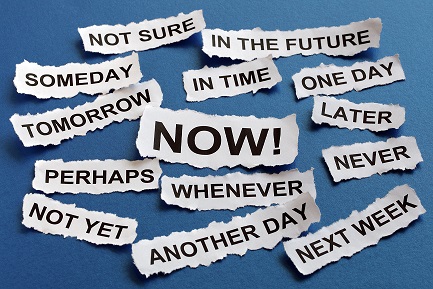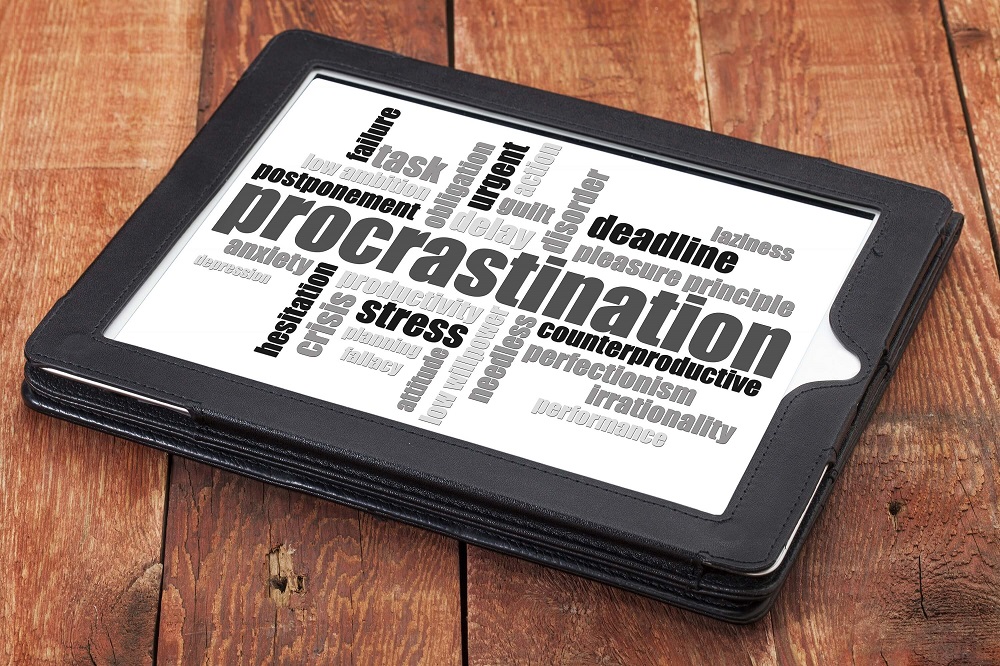- Home
- Procrastination
- Overcoming Procrastination by Increasing Discomfort Tolerance
Overcoming Procrastination by Increasing Discomfort Tolerance
Let's start with a fundamental truth: overcoming procrastination is an emotional regulation problem. It is not about poor time management or laziness.
As a busy person you've probably experienced the frustrating cycle of procrastination - you know what needs to be done but when you come to do the big, boring, or scary task, a host of uncomfortable feelings and emotions such as boredom, stress, or fatigue arise. It is only natural that when these feelings arise you want to dodge the discomfort and so you do anything other than the important stuff - only to scramble at the last minute.
The insight that we procrastinate to avoid uncomfortable feelings - shifts our focus from mere productivity hacks to increasing our emotional toolkit.
In the face of a big, boring or scary task, the procrastinator is likely to feel discomfort and chooses short-term emotional relief over long-term benefits. Since these big, boring, or scary tasks are unlikely to go away (because they are important), this procrastination can often lead to increased stress, poorer health, and more strained relationships later on.
I have found in my practice and the research supports this, that those with higher discomfort tolerance are generally more successful at beating procrastination.
Why?
Because people who have developed and built their discomfort tolerance are better placed to manage their discomfort, frustration, or tedium that often accompany the big, boring and scary tasks that are procrastinated on.
Strategies for overcoming procrastination by increasing your discomfort tolerance
Increasing discomfort tolerance isn't about pushing yourself to the limits. Its about finding the 'sweet spot' between challenge and capability, and then gradually expanding your comfort zone.
Strategy #1: Begin with baby steps
Start with small doses of discomfort. When you get used to this, gradually increase duration and intensity. For this I like two things
- the 10 minute rule and
- the Pomodoro technique.
With the 10 minute rule, you learn to focus on the output rather than focusing on the outcome. As you get used to working on the challenging task for just 10 minutes you could consider bumping it up to 15 minutes as your tolerance increases.
Strategy #2: Mindful Awareness
Mindfulness helps you observe uncomfortable feelings without automatically reacting to them.
First bring your awareness to your body and notice your breath, and observe your feelings. No judgement of the thoughts or feelings is useful.
Here I find it helpful to imagine I am watching a movie - you're not trying to change anything you are just observing and labelling your experience e.g. "here's a thought" or "here's a feeling".
Strategy #3: Overcoming procrastination with Cognitive Reframing
Discomfort does not need to be seen as a threat to avoid. If you can learn to to view discomfort as a sign of growth this mental shift transforms the experience from something to avoid into something valuable and meaningful.
Strategy #4: Physical Conditioning
I think that we have all experienced challenging physical workouts that build both physical and mental tolerance for discomfort. This experience also translates directly to improved resilience in other areas of life.
Strategy #5: Watch your Self-Talk
When we experience discomfort it is likely that you will say things that lead to the natural conclusion of postponing the task.
For example, "I don't have the energy to do this" naturally leads to delaying the activity.
Develop and practice specific phrases that help you push through difficult moments. Ones that I have found useful with my clients are "This discomfort is temporary" or "I'm building my resilience right now." Read more
Strategy #6: Have a strong Why
A crucial key to building discomfort tolerance is having a strong WHY. Nietzsche said "He who has a why for which to live can bear with almost any how" This suggests that if you clearly understand what you value and a reason that matters to you, your ability to tolerate discomfort will flow from this.
In the physical fitness analogy, it might be like buying a gym membership or an expensive tennis racket. Now I’ve spent the money, I had better go. On the other hand, it may be more personal, like a promise to yourself that you will not gain weight as your parents did. In terms of purpose and discomfort tolerance, you must be clear that you are spending this effort towards an end that you care strongly about.
The good thing is that the more you practice facing discomfort rather than avoiding it, you are rewiring your brain to create new neural pathways, making it easier to handle similar situations in the future.
Related articles you may like on overcoming procrastination
Do you have any tips to beat procrastination?
Do you have a great story about this? Share it!
What Other Visitors Have Said
Click below to see contributions from other visitors to this page...
Procrastinating on unpleasant tasks Not rated yet
How to overcome procrastination when faced with unpleasant tasks.
I find that I will do anything to put off that difficult task. When avoiding difficult …
Procrastination activity to increase your sense of urgency Not rated yet
Here is a time management activity that I recently picked up from a time management seminar to reduce procrastination.
If you are looking to remain …
4 options for overcoming procrastination Not rated yet
Overcoming procrastination is difficult because beating procrastination is about changing personal habits.
Here I provide four options to overcome …
Creative Procrastination Not rated yet
All of us procrastinate to some extent.
However, the best time-managers procrastinate on tasks that are of low importance. They procrastinate on things …
Procrastination activity Not rated yet
What activities do you Procrastinate On?
Try this procrastination activity during next week.
Carry around a small notebook and each time you notice …
I have a procrastination problem - What should I do? Not rated yet
Hi Kell,
I am procrastinating on something that I don't want to do?
I know that I must talk to my coworker Julie.
Julie has been on Facebook throughout …
Committed worker but procrastination is just dropping my productivity on those things that matter Not rated yet
Overcome procrastination for the committed worker sounds like an oxymoron.
However, over-commitment is another common cause of procrastination.
…
Is fear of failure a reason for procrastination? Not rated yet
I am putting off doing something that I am scared of. How can I deal with this fear of failure?
Maddie
Kell's reply
Hi Maddie,
A fear of failure …
Why do I procrastinate? Not rated yet
I don't know why I procrastinate but I just can't seem to get any of my major works done at school. Please help
Kell's reply
Hi Rezza,
There are …
Procrastination Problem Not rated yet
Hi there,
I have a procrastination problem that is affecting my work life. I just can't seem to get started on the big projects and my boss is starting …
Overcome procrastination and increase time management skills by reducing distractions Not rated yet
Overcome procrastination and increase time management skills by reducing distractions.
Procrastination is my middle name.
I have procrastinated …
Beat procrastination today by making small changes Not rated yet
I asked myself "How do I beat procrastination?" and make the change that I want to make.
You see, I don't like my job and don't think I want continue …
Beating procrastination - break into chunks Not rated yet
I am a massive procrastinator. I used to put off my study when I was a student and now I procrastinate at work on the Internet.
It got to be such a …




New! Comments
Have your say about what you just read! Leave me a comment in the box below.